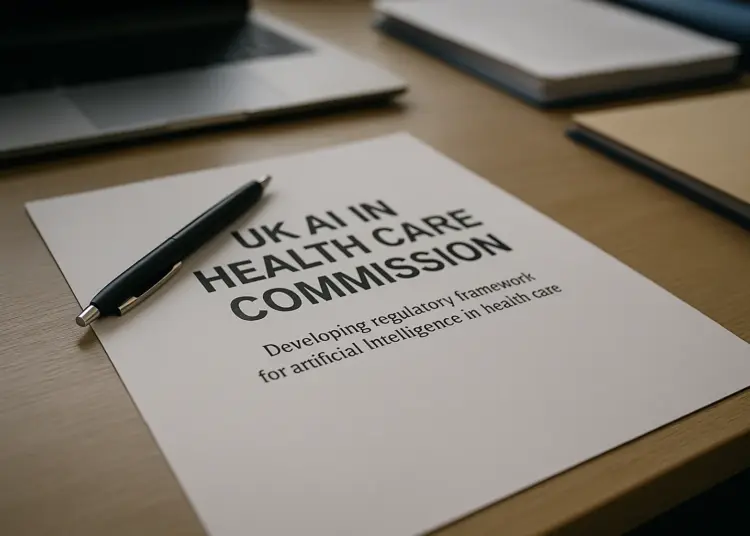Story Highlight
– UK launches commission for AI in health care.
– Commission aims to ensure patient safety and innovation.
– Framework for AI devices expected by 2026.
– Consultation includes patients, clinicians, and tech firms.
– UK seeks to improve investment climate for health tech.
Full Story
The UK government has established a national commission tasked with overseeing the integration of artificial intelligence (AI) in the healthcare sector, aiming to foster global investment while safeguarding patient welfare. This initiative convenes an array of professionals, including healthcare practitioners, academics, and regulatory authorities, to create a regulatory framework for AI-driven medical devices, with the goal of finalising this framework by 2026. Notable technology corporations, including Microsoft and Google, will be part of the consultation process.
This move comes in response to the growing presence of AI technologies in healthcare, which encompass everything from diagnostic tools to advanced assistive devices, amid a backdrop of ambiguous global regulations. The commission will be led by Alastair Denniston, an expert in healthcare AI, alongside Patient Safety Commissioner Henrietta Hughes as deputy chair. Their recommendations will be directed to the Medicines and Healthcare Products Regulatory Agency (MHRA), the body responsible for managing the regulations surrounding medical devices.
Lawrence Tallon, the chief executive of the MHRA, noted that many existing medical device regulations in the UK are outdated, having been established over 20 years ago. He cautioned that if the regulatory framework fails to evolve, it could impede innovation in the healthcare field. The completed framework is expected to be presented to Parliament in 2026, with some aspects requiring legislative changes.
The commission plans to engage directly with patients, healthcare professionals, and tech companies to find a balance between promoting innovation and managing associated risks. AI technologies are already widely used in the UK’s healthcare landscape, from transcription tools for doctor-patient interactions to diagnostic imaging systems that assist radiologists in detecting health issues. Other applications include AI software that processes substantial amounts of patient data to aid diagnoses, as well as adaptable cardiac devices responding to immediate changes in heart rhythms. Currently, these innovations operate under regulations conceived two decades ago.
Concerns have been raised by the World Health Organization regarding the potential risks of unchecked AI in healthcare, which may include unethical data harvesting, algorithmic bias, and cybersecurity vulnerabilities. This commission aims to address these gaps and establish rigorous standards for the safe deployment of AI technologies.
Internationally, governing bodies are grappling with optimal regulatory approaches for AI in healthcare. The European Union has already instituted its AI Act, which imposes strict regulations on medical AI applications. While some technology sectors have labelled the EU’s measures as excessive, the MHRA has stated that the UK will not simply duplicate these regulations. Instead, it aims to develop a framework that is both clear and practical.
As competition intensifies for AI investments, the UK government has recently secured contracts worth billions with firms such as Microsoft and OpenAI. Officials believe that establishing transparent regulations will bolster the UK’s standing as a desirable market for healthcare innovations, while also reassuring both patients and healthcare providers of the reliability of new technologies.
Tallon highlighted that the current uncertainties in global AI regulations complicate future planning for developers, healthcare providers, and investors alike. The UK seeks to provide a clear regulatory landscape by articulating specific expectations for all stakeholders involved in healthcare AI. Although some companies may approach the new requirements with caution, regulators are optimistic that stable and balanced regulations will promote long-term investment. By 2026, the framework aims to offer comprehensive standards governing AI medical devices in the UK, ensuring that the prioritisation of innovation does not compromise accountability. With AI increasingly woven into everyday clinical practices, the commission’s findings are poised to shape the future of the UK’s healthcare system and contribute to international regulatory dialogues.























This is a welcome step. Clear regulation that is developed with input from patients and clinicians will be essential to manage risk as AI tools are rolled out across the NHS. The focus must be on practical, enforceable standards for validation, clinical effectiveness, data governance and post‑deployment monitoring so that safety is not an afterthought. Engagement with major technology providers is important but must not overshadow frontline clinical perspectives or independent oversight. Timely guidance and a transparent approval pathway will help hospitals and suppliers plan safely while protecting patients and public trust.